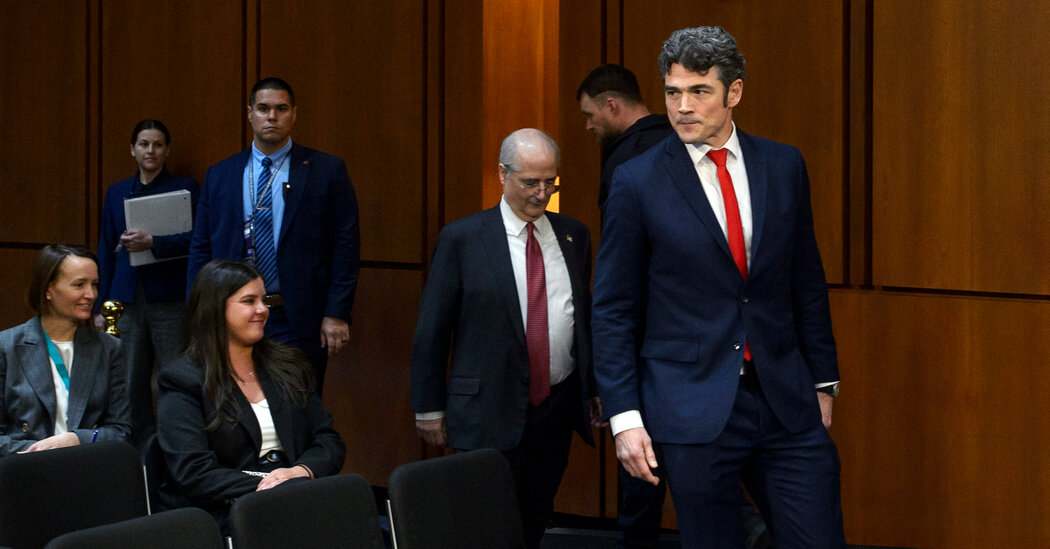BERLIN — In central Berlin, a giant billboard shows a pair of hands, arranged in the shape of a diamond, in front of a female torso dressed in a green jacket. “Tschüss Mutti,” the billboard reads. “Bye, bye, Mommy.”
Even without a face, Germans know who’s being depicted. The diamond, the colorful jacket and the word “Mutti” are iconic, just like Angela Merkel herself.
After 16 years, Germany is saying “Tschüss” to its longtime chancellor. Across the country, the departure of Ms. Merkel has brought out affectionate nostalgia, tinged with a drop of irony. Yet there’s also fatigue, verging on irritation, a twitchy restlessness to see her off and start afresh. As with most farewells, feelings are mixed.
For Ms. Merkel, a leader who never sought acclaim, a low-key, almost ambivalent exit feels fitting. But it also reveals an irony about her rule. The qualities that ensured her success — her caution and consistency, her firmness and diligence — are now, at the end of her tenure, leading some to regard her departure with relief. The Germany Ms. Merkel made, in nearly two decades of steady stewardship, is ready to move on.
For all her calm, Ms. Merkel’s time in charge has not been without tumult. She steered Germany through a series of crises — the financial crash in 2008, the euro debt crisis that followed, the migration crisis of 2015 and, of course, the pandemic. She brokered a truce, albeit a brittle one, between Russia and Ukraine, helped to negotiate Brexit and saw Donald Trump come and go. Each event had the potential to sunder the world. In part thanks to Ms. Merkel, none did.
Her role in these crises continues to be debated. Many progressives maintain that her austerity policies have done more harm than good, and many conservatives believe she should have closed Germany’s borders to migrants in 2015. The overall verdict, though, is unlikely to change. Under great pressure, Ms. Merkel was a conservative in the best sense, retaining the country’s prosperity, cohesion and purpose. Her great achievement was not what she built, but what she managed to keep.
Yet preservation can quickly turn to stagnation. Many of Ms. Merkel’s policies that had an initially stabilizing effect carried hidden long-term costs. And at the very moment she is about to leave office, that’s starting to show. Her “sins of omission” — as a British historian and Germany expert, Timothy Garton Ash, put it to me — are becoming painfully obvious.
Take Europe. Across nearly two decades, Ms. Merkel played an outsize role in guiding the union through a succession of challenges. But in the process, she stored up future problems.
In 2016, for example, the chancellor spearheaded a deal with Turkey to take in refugees. The move ended the yearlong migration crisis, in which more than a million migrants claimed asylum in Europe. But it’s hardly a sustainable solution, neither for Turkey — where economic difficulties and growing numbers of refugees threaten to destabilize the country — nor for Europe. Migrants, especially after the U.S. withdrawal from Afghanistan and the Taliban’s takeover of the country, will continue to seek refuge on the continent. Some workable solution, attentive to the needs of both migrants and citizens, must be found.
In other areas, too, Ms. Merkel’s approach fell short. Her handling of the euro debt crisis helped secure the future of the bloc, but at the cost of leaving the underlying dynamics — overindebted southern countries and an unbalanced monetary union — untouched. Her conciliatory approach to Russia, not least over the controversial Nord Stream 2 gas pipeline, looks ever more untenable as President Vladimir Putin ruthlessly consolidates his regime.
And while her inclination to avoid censuring Hungary and Poland for their breaches of the rule of law protected the bloc against disintegration, it sidestepped essential questions about the character of Europe. In Ms. Merkel’s absence, European leaders — including Germany’s next chancellor, whoever that is — will need to determine the bloc’s future course. How will it navigate the increased rivalry between America and China? To what extent will it embark on a more autonomous defense strategy? And how will it combat the rise of the far right?
At home, a similar pattern prevailed. Look at the economy. Yes, Germany’s export surplus came to an all-time high during Ms. Merkel’s tenure, and G.D.P. reached a record high in 2019. But it has come at the cost of an increased — some say excessive — dependence on the Chinese market, something Ms. Merkel has done little to address. What’s more, by shielding Germany’s car industry from more ambitious carbon-emission goals, Ms. Merkel has in effect exonerated managers from the need to innovate. That’s one reason German car companies are scrambling to keep up with their American and Chinese counterparts.
Then there’s climate change. Trying to protect key industries and fearing to impose too much change on voters, Ms. Merkel refrained from any far-reaching plan to cut emissions until late in her tenure. And though the share of renewable energy grew to 45 percent during her time in office, many experts agree that on its current trajectory, the country will not meet its goal of being carbon-neutral by 2045. Despite being seen abroad as the “climate chancellor,” Ms. Merkel has taken only very minor steps toward confronting the defining issue of our time.
It all adds up to a country at once cozy and cosseted, ignorant of the dangers waiting in the wings. Ursula Weidenfeld, an economics journalist and the author of a recent biography of the chancellor, has likened Ms. Merkel’s Germany to the Shire in J.R.R. Tolkien’s “Lord of the Rings.” Peaceful and prosperous, soothingly old-fashioned, self-satisfied to the point of delusion and naïve in a likable yet unnerving way: The analogy is apt.
Ms. Merkel protected the Shire, which is what Germans expected of her and why she won four national elections in a row. But in doing so, she fostered its peculiar detachment from the world and its unwillingness to change, innovate or even discuss different ways forward.
The chancellor also became stuck in her ways. Humble and unpretentious, she saw herself as a servant to her country. But in return for her service, dedication and competence, she came to expect — demand, even — blind trust. She has grown increasingly impatient with the forever chatter of Germany’s political class.
Her famous phrase during the migration crisis — “We can do this” — was to some a welcome dose of optimism. But to others, not least in her own party, it was a decree, a royal diktat from above silencing opposition and curtailing debate. Perhaps that tendency hardened over time. Ahead one of the endless meetings with Germany’s 16 governors during the pandemic’s first wave in 2020, she reportedly complained about the “orgies of debates on reopening the country.”
It was an unusual outburst, one that underscored a growing unease about her methods and her achievements. After all, the pandemic exposed Germany’s lack of digital services, the need to modernize its public health service and the vulnerability of the economy’s supply chains. The floods in July, in which over 200 people lost their lives, were a tragic reminder that Germany will not be spared the perils of climate change. Against this backdrop, the prospect of change — no matter how familiar the candidates — has become more appealing.
Just a couple of years ago, Ms. Merkel was garlanded as the “leader of the free world.” Against the chaos and disruption of Mr. Trump, her sober, judicious style was widely envied. Now, in a twist of history, different qualities are wanted. I’m pretty sure there will be many moments in the not-too-distant future when Germans will painfully miss Angela Merkel. And yet: It is time. Tschüss Mutti.
Anna Sauerbrey (@annakatrein) is an editor and a writer at the German daily Der Tagesspiegel.
The Times is committed to publishing a diversity of letters to the editor. We’d like to hear what you think about this or any of our articles. Here are some tips. And here’s our email: letters@nytimes.com.
Follow The New York Times Opinion section on Facebook, Twitter (@NYTopinion) and Instagram.


